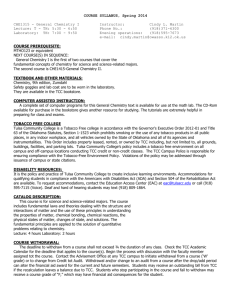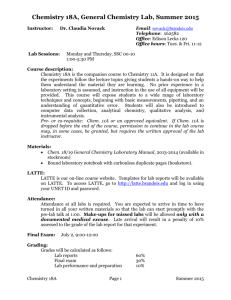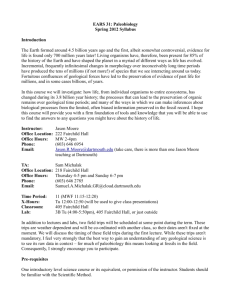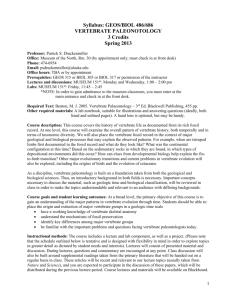Syllabus - Berkeley City College
advertisement
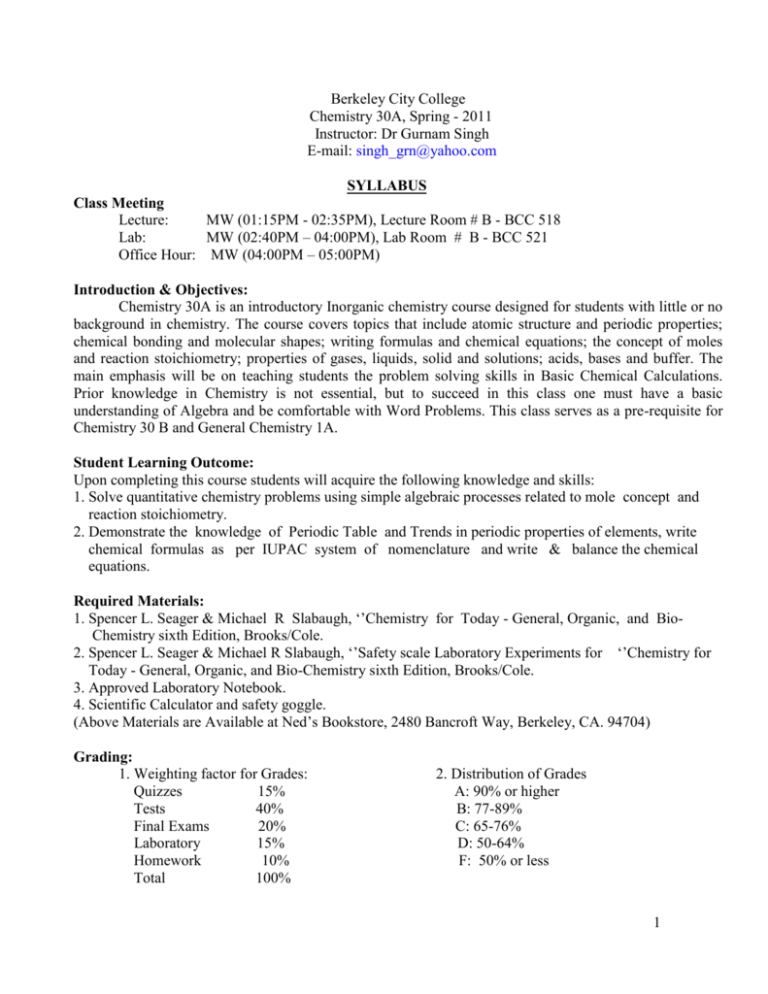
Berkeley City College Chemistry 30A, Spring - 2011 Instructor: Dr Gurnam Singh E-mail: singh_grn@yahoo.com SYLLABUS Class Meeting Lecture: MW (01:15PM - 02:35PM), Lecture Room # B - BCC 518 Lab: MW (02:40PM – 04:00PM), Lab Room # B - BCC 521 Office Hour: MW (04:00PM – 05:00PM) Introduction & Objectives: Chemistry 30A is an introductory Inorganic chemistry course designed for students with little or no background in chemistry. The course covers topics that include atomic structure and periodic properties; chemical bonding and molecular shapes; writing formulas and chemical equations; the concept of moles and reaction stoichiometry; properties of gases, liquids, solid and solutions; acids, bases and buffer. The main emphasis will be on teaching students the problem solving skills in Basic Chemical Calculations. Prior knowledge in Chemistry is not essential, but to succeed in this class one must have a basic understanding of Algebra and be comfortable with Word Problems. This class serves as a pre-requisite for Chemistry 30 B and General Chemistry 1A. Student Learning Outcome: Upon completing this course students will acquire the following knowledge and skills: 1. Solve quantitative chemistry problems using simple algebraic processes related to mole concept and reaction stoichiometry. 2. Demonstrate the knowledge of Periodic Table and Trends in periodic properties of elements, write chemical formulas as per IUPAC system of nomenclature and write & balance the chemical equations. Required Materials: 1. Spencer L. Seager & Michael R Slabaugh, ‘’Chemistry for Today - General, Organic, and BioChemistry sixth Edition, Brooks/Cole. 2. Spencer L. Seager & Michael R Slabaugh, ‘’Safety scale Laboratory Experiments for ‘’Chemistry for Today - General, Organic, and Bio-Chemistry sixth Edition, Brooks/Cole. 3. Approved Laboratory Notebook. 4. Scientific Calculator and safety goggle. (Above Materials are Available at Ned’s Bookstore, 2480 Bancroft Way, Berkeley, CA. 94704) Grading: 1. Weighting factor for Grades: Quizzes 15% Tests 40% Final Exams 20% Laboratory 15% Homework 10% Total 100% 2. Distribution of Grades A: 90% or higher B: 77-89% C: 65-76% D: 50-64% F: 50% or less 1 Course Content: 1. Lectures: Lectures will cover chapters 1 through 10 of the recommended. Related Materials not found in the text may be included in lectures. You are strongly encouraged to take notes during lectures and participate during class discussions. 2. Homework, Quizzes, Tests, and Final Exam. Homework provides you with the necessary exercises in problem solving skill that cannot be accomplished in the classroom. It also helps you understand the concept discussed in each Chapter. Complete Solutions (NOT just the answers) of the assignment problems must be indicated and no credit will be given otherwise. (The list of end-of-chapter problems for homework assignments is attached to this syllabus.) There will be nine (9) quizzes, two (2) midterm tests, and a final examination. There will NOT be any make-up on Quizzes, tests or the final exam, but two of the lowest quiz scores will be discarded. Schedules for quizzes and tests are indicated in this syllabus. Please make every effort to ensure your availability for the schedule dates. The final exam will be given during the final week of the semester. 3. Laboratory Exercises: Laboratory is an essential part of the Chemistry course and the experiments are designed to illustrate some of the Chemical Principles that have been discussed in Lectures. There will be 10-12 experiments to be completed and each will result in a report. You must personally do each experiment and turn in the lab report to obtain the lab credit. Each report must be turned in within one week after the experiment is completed. Points will be deducted from late submission of reports, and lab reports that are more than (2) weeks overdue MAY NOT be accepted. While some experiments may be done with a partner, lab reports must be individual work and you are responsible for turning them in on or before the due dates to avoid penalties. Getting ready for the lab requires you to read and be familiar with the concept of each experiment. It is important that you read the experiment and prepare your lab notebook before coming to the lab. Writing the pre-lab for each experiment is a necessary exercise, which will be checked and graded. (Please read the supplement on pre-lab write-up.) 4. Safety in the Laboratory Lab safety is of primary importance. You are expected to conduct the only the assigned experiments. ANY OTHER KIND OF EXPERIMENTATION WITH CHEMICALS IS STRICTLY PROHIBITED. Always read labels on reagent bottles before using them. Be aware of the safety hazards related with each Chemical you come in contact. YOU ARE REQURED TO WEAR APPROVE SAFETY GOGGLES DURING LAB, regardless of whether you are doing an experiment or not. TOE-COVERED SHOES MUST BE WORN IN THE LABORATORY; STRICTLY NO SANDLES, FLIP-FLOPS OR SLIPPERS. It is strongly recommended that you wear protective clothing. If you are wearing short, short-skirts or sleeveless shirt, you will be required to wear a proper lab-coat. 2 Reading/Studying 1. Tentative Lecture and Laboratory schedules will be provided. You are responsible for keeping ahead in reading the textbook and the Laboratory Manual. Read the chapter prior to lecture and review lecture materials as soon as possible. 2. Do the homework promptly and do not fall behind, but DO NOT DO HOMEWORK DURING CLASS OR LAB, as it defeats the purpose of attending lectures. However, you may ask questions about homework problems during first 10-15 minutes of the lecture periods. 3. Studying is not the same as reading. Studying is an active process. It includes solving problems summarizing ideas and concepts in your own words, and memorization. Whenever possible study with a friend or a study group and meet regularly. Academic Decorum and Attendance 1. Attendance during lectures and labs will be recorded. Be sure to sign the attendance sheets. Please contact/inform me, if you find yourself in a situation that might cause you to miss more than a week of classes. 2. Please be Punctual! If you arrive late, enter quietly. If you must leave the class early sit where you can leave with a minimum disruption to your fellow student and the instructor. 3. Please respect the desire of others to learn and do not talk during lectures, if you have questions regarding the lecture, please raise your hand. You are strongly encouraged to ask questions and be actively involved in the class discussions. 4. CELL PHONES AND PAGERS MUST BE TURNED OFF DURING LECTURES AND THE LABS. Integrity 1. All work submitted for grading must be your own work. Copying is cheating and is therefore an unacceptable behavior. Cheating during quizzes, tests, or exams will earn you an automatic zero for that test, quiz or exam. 2. Be a full and active participant when you work on assignments with others. If you just copied the groups or your partner’s answers, you haven’t learned anything and you are wasting your time. CHEMISTRY IS BOTH FUN AND CHALLANGING, BUT YOU NUST BE WILLING TO WORK AND TAKE TI’S FULL ADVANTAGE. GOOD LUCK! I WANT YOU TO SUCSSEED IN THIS COURSE 3 Academic Calendar for Spring - 2011 Jan. 24 M First day of class Feb. 05 S Last Day To Add classes Feb. 08 T Last Day To Drop classes with Refund Feb. 14 M Censes Day – Instructors verify enrollment in Classes Feb. 18 F Lincoln Day Holiday Feb. 21 M Washington’s Day Holiday Feb. 24 R Last Day to drop without “W” Mar. 18 F Apr. 18 - 24 M-S Last Day to file Petition for AA or AS Degree/Certificate Spring Recess Apr. 22 F Cesar Chavez’s Day Holiday Apr. 25 M Last Day to Drop and Receive a “W” May 19. R Malcolm X’s Day Holiday May. 21 - 27 S - F Final Exams May. 27 Spring – Semester Ends. F 4 Berkeley City College, Chem 30A Schedule, Spring 2011 ----------------------------------------------------------------------------------------------------------------------Week Date Lecture/ Topic Quiz/Test ----------------------------------------------------------------------------------------------------------------------1 01/24 Lect 1 Course Outline; Chap-1: Matter, Measurements & Calculation (1.1 – 1.3) 01/26 Lect 2 Chap1; Matter, Measurements & Calculation (1.4 – 1.8) Lab-1 Video on Lab Safety 2 01/31 Lect 3 Lab-2 02/02 Lect 4 Lab-3 Quiz#1 Chap 1: Matter, Measurements & Calculation (1.9 – 1.11) Expt # 1: Measurement and Significant Figures Chap 2: Atoms and Molecules (2.1 – 2.3) Expt # 2: The Use of Electronic Balance (Chapter 1) 3 02/07 Lect 5 Lab-4 02/09 Lect 6 Lab-5 Chap 2: Atoms and Molecules (2.4 – 2.5) Expt # 3: Volume and Density Determination (Day-1) Chap 2: Atom and Molecules (2.6 – 2.7) Expt # 3: Volume and Density Determination (Day-2) 4 02/14 Lect 7 Lab-6 Quiz#2 02/16 Lect 8 Lab-7 Chap 3: Electronic Structure & Periodic Law (3.1 – 3.3) Expt # 4: Physical and Chemical Changes (Day1) (Chapter 2) Chap 3: Electronic Structure & Periodic Law (3.4 – 3.6) Expt # 4 Physical and Chemical Changes ( Day 2) 5 02/21 No Lecture Washingtons’ Holiday 02/23 Lect 9 Chap-4: Forces Between Particles (4.1 – 4.3) Lab-8 Expt # 5: Separation and Analysis (Day 1) Quiz # 3 ( Chapter 3) 6 02/28 Lect 10 No Lab 03/02 Test # 1 Lab- 9 Chap 4 : Forces Between Particles (4.4 – 4.8) Test Review ( Chapter 1-3) ( Chapter 1-3) Expt # 5: Separation and Analysis (Day 2) 7 03/07 Lect 11 Lab-10 03/09 Lect 12 Lab-11 Quiz # 4 03/14 Lect 13 Lab-12 03/16 Lect 14 Lab-13 Chap-4: Forces Between Particles (4.9 – 4.11) Expt # 6: Classification of Chemical Reactions (Day 1) Chap-5: Chemical Reactions – Balancing Equations (5.1 – 5.3) Expt # 6: Classification of Chemical Reactions (Day 2) (Chapter 4) Chap-5: Chemical Reactions and Balancing Equations (5.4 – 5.5) Expt # 7: Analysis by Decomposition Reactions (Day 1) Chap-5: Chemical Reactions – Stoichiometry (5.9 – 5.11) Expt # 7: Analysis by Decomposition Reactions (Day 2) 8 5 9 03/21 Lect 15 Lab-14 Quiz # 5 03/23 Lect 16 Lab 15 Chap-6: The States of Matter (6.1 – 6.8) Expt # 8:Determination of Gas Constant R (Chapter 5) Chapter 6: The States of Matter ( 6.9 – 6.15) Expt # 9: Solution Formation and Characteristics (Day 1) 10 03/28 Lect 17 Lab 16 Quiz # 6 03/30 Lect 18 No Lab Chap 7: Solutions and Colloids (7.1 – 7.4) Expt # 9 Solution Formation and Characteristics (Day 2) (Chapter 6) Chap 7: Solutions and Colloids (7.5 – 7.7) Test Review (Chapter 4-6) 11 04/04 Test # 2 04/06 Lect 19 Lab-17 (Chapter 4-6) ---- No L ab Chap 7: Solutions and Colloids (7.8 – 7.10) Expt # 10 : Colligative Properties of Solutions (Day 1) 12 04/11 Lect 20 Lab-18 Quiz # 7 04/13 Lect 21 Lab-19 Chap 8: Reaction Rates and Equilibrium (8.1 – 8.4) Expt # 10 : Colligative Properties of Solutions (Day 2) (Chapter 7) Chap 8: Reaction Rates and Equilibrium (8.5 – 8.8) Expt # 11: Reaction Rates and Equilibrium (Day 1) 13 04/25 Lect 22 Lab-20 Quiz # 8 04/27 Lect 23 Lab-21 Chap 9: Acids, Bases, and Salts (9.1 – 9.3) Expt # 11: Reaction Rates and Equilibrium (Day 2) (Chapter 8) Chap 9: Acids, Bases, and Salts (9.4 – 9.9) Expt # 12: Acids, Bases, Salts, and Buffer (Day 1) 14 05/02 Lect 24 Lab-22 05/04 Lect 25 Lab-23 Chap 9: Acids, Bases, and Salts ( 9.10 – 9.11) Expt # 12: Acids, Bases, Salts, and Buffer (Day 2) Chap 9: Acids, Bases and Salts (9.12 – 9.13) Analysis of Vinegar 15 05/09 Lect 26 Quiz # 9 05/11 Lect 27 No Lab Chap 10: Radioactivity and Nuclear Processes (10.1 – 10.3) (Chapter -9) Chap 10: Radioactivity and Nuclear Processes (10.4 – 10 .6) Review for Finals 16 05/16 Lect 28 05/18 No Lab Chap 10; Radioactivity and Nuclear Processes (10.6– 10.9) Review for Finals 17 05/24 Final Exams – comprehensive 6 Laboratory Notebook and pre-lab write-up: In this class, you are required to keep a lab-notebook. Most collage level Chemistry courses include maintaining a lab-notebook as a part of their curriculum. I would like you to develop the professional skill of keeping a lab-notebook. Use only non erasable INK-PENS when entering the data into your labnotebook. (Calculations may be done with pencil.) DO NOT Use the laboratory notebook for taking lecture notes. Pre-lab Writ-up (Before lab): A pre-lab write-up must be completed before you come to the lab and must be done in duplicate and in ink. Start each pre-lab write-up on a new page with the following headings: 1. Your name and your partner’s name (if the experiment is done with a partner). 2. Date the experiment is done. 3. Experiment number and title. 4. Objective: The objective of an experiment is a statement of the goal or goals of the experiment; that is, what the experiment intends to show, prove and/or determine. 5. Summarize or overview State briefly what the experiment is about, what materials and equipment will be used; what data (measurements/observations) will be collected and what calculations will be done to achieve the intended goal(s). Be complete, but no need to go into details. Provide the mathematical formulas or equations that will be used in the calculations. If an experiment involves a Chemical Reaction, write the balanced Chemical equation for the reaction. However, if the experiment is about Chemical Reactions and writing balanced equation is the objective, then you do not have to write the equation in this section, because you will be writing them under the result section. Example: Experiment #1-The Metric Measurements Objectives: The goal of this experiment is to familiarize students with the metric system and to provide relevant exercise on unit conversions in the Metric System. Overview: Measurements of lengths, volumes, and masses using the Metric units will be carried out on several Laboratory items listed in the data table and unit conversions will be performed on these measures values. Sometimes, an experiment has several parts or several objectives; then, there will be more than one statement of goals. A general statement can be given in the overview section with the Chemicals and/or Chemical Reactions listed in the data table For example: 7 “The objective of this experiment is to determine which pair of Chemicals, as given in the data table, will yield observable reactions. Observations will be made to identify each reaction and balanced molecular and net ionic equations will be given on those reactions with positive observations.” 6. Procedures: Write down the reference source for the experiment, such as, Seager and Slabaugh, “Experiments General, Organic, and Bio-Chemistry for today”, 6th edition, pages?? List in order what needs to be done (in short sentences).You nay only refer this list in carrying out the experiment. 7. Data Table You may use the formatted data sheet from the text. Alternatively, you may prepare a blank data table in your lab-notebook before you come to the lab. Include label for the data. You will be taking and leave space for the actual data. Leave enough blank spaces for making notes and corrections and make sure the table is properly organized and legible. 8. Data Entry – this MUST be done in INK During lab, data (measurements/observations) are entered as you go along. Data must be legible and labeled descriptively, so that someone else with your background reading the notebook knows what each piece of data represents. No pieces scrape paper should ever be used. If a mistake is made, simply draw a single line (neatly) across it. Do not scribble, obliterate, or use whiteout. 9. Calculations – this must be done with pencil during or after the lab-period Do these in a lab-notebook as well. Label Calculations and show your work in good style. Make sure to write the proper units in your Calculations and results, and report all values with the appropriate number of significant figures and units. 10. Lab-reports A complete lab-report should contain all the above features-Title, Objective, Summery, or Overview, a complete Data, results, and sample calculations. Turn in the original copy of the duplicate, within one week of the experiment is completed. (If you are using the formatted data sheet from the text, staple these together with the pages from your lab-notebook that contains the title, objectives, procedures, and Calculations when you turn in you final report.) 8 Chemistry 30A, Spring - 2011 Homework Assignments Chapter 1: 5, 8, 13, 19, 23, 30, 33, 36, 41, 43, 49, 55, 60, 61, 63, 65, 67, 69, 73, 76, 81, 84, 87, 89, 93, 95, 97. Chapter 2: 3, 4, 5, 7, 9, 11, 13, 17, 19, 21, 29, 33, 37, 38, 41, 42, 43, 46, 48, 51, 52, 53, 55, 59, 60, 61. Chapter 3: 1, 3, 5, 7, 8, 9, 11, 13, 15, 17, 19, 22, 23, 24, 25, 27, 29, 30, 31, 35, 37, 39, 40, 41, 43, 44, 45. Chapter 4: 1, 3, 5, 7, 8, 11, 12, 13, 15, 17, 19, 21, 23, 27, 29, 31, 32, 33, 35, 37, 39, 47, 48, 52, 59, 65, 67, 68, 72, 77, 79. Chapter 5: 2, 3, 4, 7, 9, 12, 13, 14, 17, 18, 20, 22, 25, 28, 29, 30, 31, 33, 35, 37, 39, 42, 45, 47, 48, 49, 53, 55, 57. Chapter 6: 1, 5, 7, 9, 12, 15, 17, 19, 24, 25, 27, 30, 33, 37, 38, 41, 46, 49, 53, 56, 59, 61, 63, 65, 67, 68, 71, 72, 75, 78. Chapter 7: 1, 2, 3, 5, 7, 10, 12, 14, 15, 17, 19, 21, 25, 26, 29, 32, 36, 40, 41, 43, 48, 49, 53, 59, 60, 64, 67, 72, 75. Chapter 8: 1, 3, 4, 6, 7, 10, 12, 14, 15, 17, 19, 21, 25, 29, 32, 35, 36, 38, 39, 42, 45, 46, 51, 53, 55, 56. Chapter 9: 3, 5, 6, 9, 10, 13, 16, 19, 21, 25, 32, 35, 38, 41, 48, 52, 55, 58, 62, 64, 68, 74, 75, 82, 88, 91, 95, 97. Chapter 10: 3, 5, 7, 9, 12, 13, 15, 16, 17, 18, 21, 22, 24, 25, 26, 28, 30, 32, 34, 35, 37, 39, 41, 42, 44, 45, 46, 49. 9 Berkeley City Collage Chemistry 30A, Spring – 2011 Classroom Survey Your Name: _________________________________________. Tel.No_(____) - ______________________ e-mail:______________________________ 1. What are your academic and career goals? How would this class help you that goal? 2. Do you have High School Chemistry or equivalence? If yes, when? 3. Do you have High School Algebra or the equivalence? If yes, when? 4. How do you feel about Math problems in general? 5. Which Chemistry classes are you planning to take after completing Chem. 30A? 6. What is your Academic load? ____________hr/wk 7. Are you working Part time/Full time? What is your workload? ___________hr/wk 8. Which learning styles best apply to you? a) Visual and Verbal learning style b) Visual/Nonverbal learning style c) Tactile/Kinematics (or hands on) Learning style d) Auditory/Verbal Learning style 9. To pass this class, you’ll have to spend a minimum of five (5) hours per week outside the class periods, studying the lecture materials and working in various assignments. Will that be a problem to you? 10. Please list any questions that you might have regarding that course? 10

